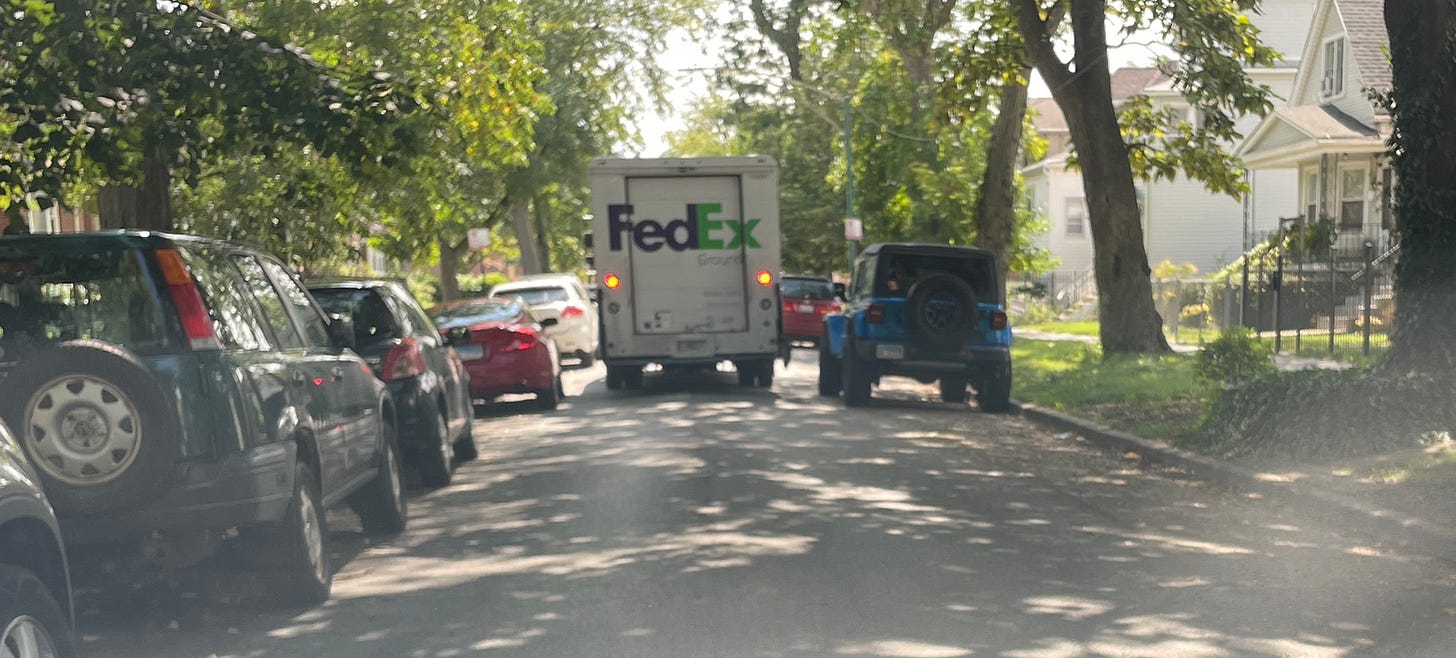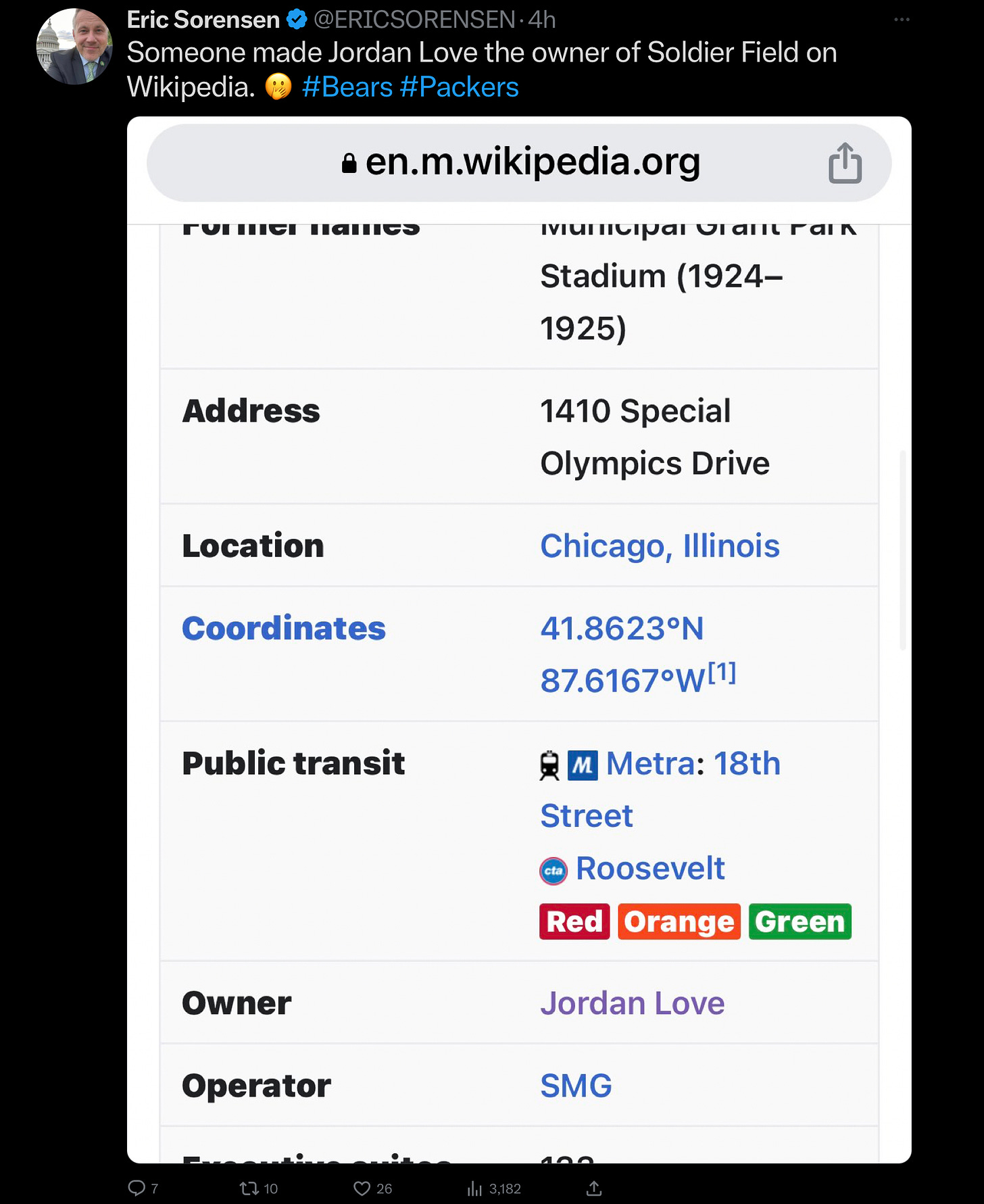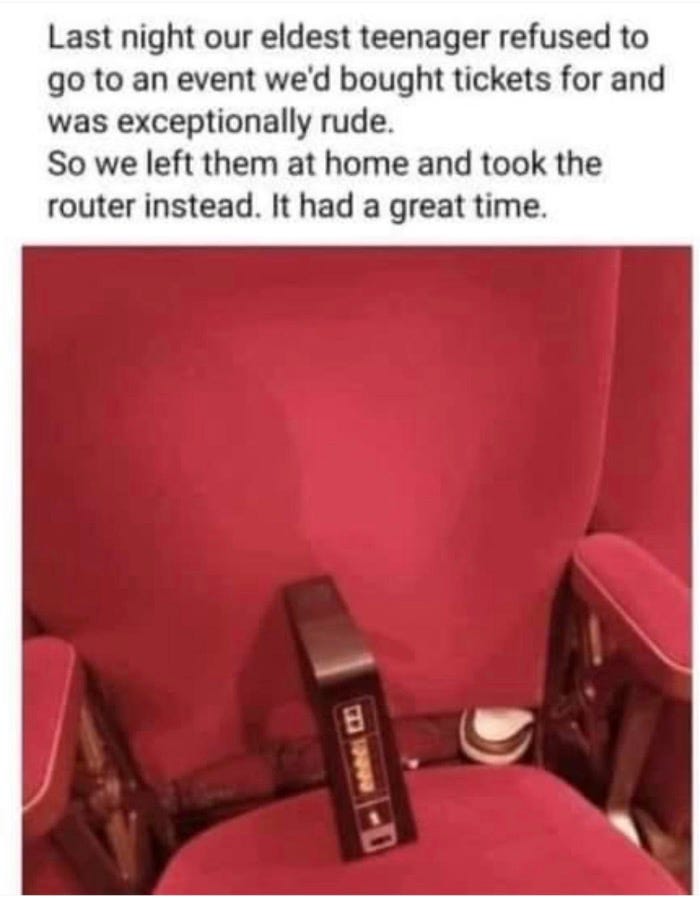Steve Dahl reacts to my anniversary coverage
& Readers take issue with my defense of voucher opponent Stacy Davis Gates
To read this issue in your browser, click on the headline above.
Eric Zorn is a former opinion columnist for the Chicago Tribune. Find a longer bio and contact information here. This issue exceeds in size the maximum length for a standard email. To read the entire issue in your browser, click on the headline link above. Paid subscribers receive each Picayune Plus in their email inbox each Tuesday, are part of our civil and productive commenting community and enjoy the sublime satisfaction of supporting this enterprise.
Steve Dahl is understandably irritated at my use of ‘reportedly’ to describe his sobriety
Last week marked the 30th anniversary of the breakup of the legendary radio team of Steve Dahl and Garry Meier and I wrote about that in Thursday’s Picayune Sentinel. I spoke to Meier for my commentary, but noted that Dahl had not returned my request for an interview. But he shared some thoughts Friday with listeners to the daily “Steve Dahl Podcast.”
First, he allowed that my request for comment “just kind of fell through the cracks” during a busy week for him. He said “it’s my bad” that he didn’t get back to me and added “I certainly am paying the price for it.”
Dahl said, “The thing that really irritated me was that Eric wrote, ‘Dahl, now 68 and reportedly sober since 1995 …’ Seriously? Reportedly?”
I wrestled with the idea of using that word. I’d seen published accounts along the way that Dahl had licked his problems with addiction, but since I hadn’t been able to hear that from him directly I wasn’t confident enough to assert his long-time sobriety as fact.
Still, “reportedly,” though accurate in this case, carries a whiff of doubt — like “supposedly” or “purportedly” — rather than simple uncertainty. The same is true of “claims,” which is a verb that most editors will tell their writers to avoid. “Zorn claims he’s lived in Chicago since 1980” has a very different, far more skeptical feel than “Zorn says he’s lived in Chicago since 1980.”
I should have worked harder at removing the insinuation that I might not believe him, so let me try to straighten this out to alleviate some of his understandable irritation: “Dahl said on his podcast that he has been sober since June 24, 1995, and I have absolutely no reason to doubt him.”
“I had a drinking — a substance — problem,” he said on his podcast. “I didn't make it easy” on his air partner Meier.
To Meier’s claim that money didn't matter at all in his decision to sever the partnership, Dahl said “That's not true. That's completely not true.” Dahl, who employed Meier, said he “couldn’t live with” Meier’s demand for an even split of Dahl’s income from the show. “Because I know how much work I did,” he said. “And I was drunk, so it was even harder for me to do the work.”
In 1996, the Tribune’s Rick Kogan reported:
Dahl was the star in more than billing. He took two-thirds of the duo's salary, estimated to be in the neighborhood of $6.5 million for five years in their last contract.
Dahl said on the podcast that the $6.5 million figure was “high” and that, given how he covered all related expenses — bookkeeping and negotiating — he only ended up with 5% to 10% more money than Meier.
He said he told Meier that the arrangement was “fair,” saying “you're still making a ton of fucking money. You don't have to do anything except show up” in the studio each day.
As a listener back then, I felt Dahl was the star and Meier was the very capable sidekick.
In 2013, 20 years after their high-profile split, the duo was inducted into the Radio Hall of Fame. Meier showed up for the ceremony but Dahl didn’t, and Meier didn’t mention Dahl in his acceptance speech.
I quoted Meier last week: “Steve didn’t show up, so — what? — I was supposed to carry his water for him? He didn’t care enough to be there, and I was supposed to cover for him and cover him with accolades? That’s on me?”
Dahl gave his version of events to his podcast listeners:
“I tried to contact him for like two months” prior to the ceremony. “I left him messages saying, ‘Dude, we have to do this together. We did all this together. We should both get up at the same time and talk. He would not do that.”
When Meier refused, Dahl backed out.
“I would rather get along with (Meier) than not get along with him,” Dahl said. “We did some cool things together. I'm just gonna let it go. But I am sober. I'm not ‘reportedly’ sober. I have tried every way possible to make amends, which is part of the 12 steps. And he just won't let me. So I don't know. I don't know what else to do.”
Notes and comments from readers —lightly edited —- along with my responses
Last Thursday’s entry in defense of Chicago Teachers Union president Stacy Davis Gates’ decision to send her son to a Catholic high school drew mostly critical responses from readers. Davis Gates is an outspoken critic of directing public money to pay for private education and so her detractors branded her as a hypocrite, saying she wished to deny poor families the same chance she has to choose the best school for their children.
I argued that it’s a sad truth of life that poor families have fewer choices than better off families when it comes to housing, health care, food and so on, as well as education. Davis Gates would not deny anyone the right to spend their own money sending their children to private schools, just as she has done. Further, the consequences of moving to an increasingly privatized public education system appear dire to me.
Here are a few highlights from the voluminous response:
Michael C. — You don’t want to siphon off or lure away the most motivated, best-behaved students from the Chicago Public Schools system through school choice. Rather, you would have these students remain trapped in a system that fails them academically and socially on a daily basis. That doesn’t sound fair.
Zorn — What doesn’t sound fair to me is comparing private schools — which can curate their student bodies — with public schools that must accept all comers. What doesn’t sound fair to me is diverting the funds from those public schools into private schools and then, when the higher-performing students leave, whining about the “failing” public schools.
The accusation that voucher opponents — or public school teachers — don’t care about students and are happy to see them “trapped” in substandard schools also doesn’t sound fair to me. I believe that transforming public education into a patchwork of lightly regulated private schools funded largely by tax dollars will lead to all kinds of trouble and leave a lot of children worse off than they are now.
Andy Shaw, former director of the Better Government Association — You, as a proud liberal, should support government assistance to low income parents who want better schools for their kids than neighborhood CPS schools offer.
If you believe government should spend additional dollars in low-income communities on health care, policing, violence prevention, mental health services, substance abuse counseling and job training for low income residents, why not on school choice if neighborhood schools aren’t cutting it?
Zorn — As a proud liberal I support additional government intervention in economically distressed communities, including additional resources to public schools that face the biggest challenges. The offhand observation that certain “neighborhood schools aren’t cutting it” prompts me to issue again the challenge I issued last week. Why do you think they’re “not cutting it”? The implication seems to be that public school teachers are indolent and administrators just don’t give a shit.
The following comment from another proud liberal offers a better guess.
Aviva Patt — It’s no mystery why educational achievement is better in some schools than others: Better educated parents, more stable and affluent home environments, and all the advantages that come from those factors.
The schools that struggle are overwhelmingly in poor neighborhoods and they need far greater financial support to help the students overcome the problems arising from poverty. These children are less likely to have a home computer or internet. Their parents are less likely to have a college education or even a high school diploma and are therefore not able to provide as much help with homework, especially after middle school. Children are more likely to have untreated or undiagnosed health problems that interfere with school attendance.
They are more likely to be the providers of child care for younger siblings or elder care for sick parents or grandparents, resulting in missing school. They are more likely to suffer from food insecurity and malnutrition, causing learning problems. They are more likely to live in homes and neighborhoods with high levels of lead contamination, which causes irreversible brain damage. They are more likely to move frequently (and may sometimes be homeless) resulting in interrupted education. And because the neighborhoods they live in tend to have high levels of crime, they are more likely to be suffering from trauma that interferes with every aspect of their life, including education.
In fact, studies have found that the levels of PTSD in some urban neighborhoods is equivalent to that of children who have survived wars. These are problems that require intense intervention and support and a lot more money than CPS spends. It is why CTU and education reformers have demanded full-time social workers and nurses in every school. Yet we still have schools that are lucky if they have a nurse for a few hours each week.
Zorn — CPS critics point out that the district’s per-pupil spending is close to $30,000 a year, and the return on that investment is lousy compared to many suburban districts with lower per-pupil costs and far higher test scores. Earlier this year, WBEZ posted “Why has the CPS budget increased while enrollment has shrunk?” to delve into this seeming paradox.
Meanwhile, those who bang on about the costs need to explain why, when Juan Rangel oversaw 16 United Neighborhood Organization (UNO) charter schools, he was drawing a salary higher than the superintendent of more than 600 CPS schools.
David L. — What is lacking in public education and is glaringly apparent in Chicago Public Schools is the total absence of accountability and incentives. There needs to be regular teacher competency testing and evaluation. Superior teachers should be rewarded for excellence and poor performing teachers should be given an opportunity for remedial training, and then if there is still no improvement they should be dismissed to protect the children from their incompetence.
Zorn — If unions were the problem, then you’d expect states with non-union public school teachers to outperform states where teachers are unionize. Former Kalamazoo Gazette reporter Julie Mack took a look at this in a 2011 article:
There are 10 states that do not have legally enforced collective bargaining for teachers. Of those only one — Virginia — have results on the National Assessment of Academic Progress tests that are above the national average, and four — Arizona, Alabama, Louisiana, and Mississippi — were in the bottom quintile.
These data are old and correlation may not equal causation, but the expectation that teachers in high-poverty schools should work miracles or else be shown the door will probably not result in anything but highly focused efforts at achieving better test scores, which reflect only a narrow gauge of effective pedagogy.
Joe E. — By your reasoning, we should prohibit Section 8 housing and return to the days of the Cabrini-Green and Robert Taylor Homes high-rise public housing projects. Providing schooling to children according to zip code fosters racial separation, a cancer on the body politic.
Zorn — No, because subsidized housing doesn’t compete with or threaten the now outmoded high-rise projects. But by the reasoning of voucher proponents, we should open up public education to the tender mercies of the marketplace, where private schools can refuse to accept “problem” students or can jack up their tuitions to discourage the enrollment of certain low-income kids (see “Priciest private high schools rarely accept vouchers.”)
Theodore M. — This would not be an issue if Chicago Public Schools maintained the top-to-bottom and center-out rigor that parents seek when turning to charter schools.
Zorn — The idea behind public charter schools, recall, was that they would be temporary laboratories for educational ideas that, if proven effective, would be incorporated into conventional schools. The issue here should be addressed in negotiations involving academics, educators, parents and politicians about what we have learned works best and how we incorporate that knowledge into public schools.
Marty G. — Thanks for the heads up on Songs of Good Cheer. My tickets are in hand (well, in my phone anyway)
Zorn — I’m excited to see you and other PS readers there! .Here is the link for tickets to the Dec. 7-10 shows, now in their 25th season.
Also I hope to see some of you at the live taping of “The Mincing Rascals” podcast at The Second City from 6-8 p.m. a week from Tuesday, Sept. 26. Ticket info.
Bob R. — I appreciate your noting the significant dangers associated with riding electric scooters, especially without a helmet. There is a new and serious danger arising rapidly that has not received much attention from media or community elected officials. The newer battery-powered scooters, e-bicycles and e-unicycles go way too fast on pathways that formerly were restricted to walkers, runners, roller-bladers and bicyclists. Most of these pathways are already specifically restricted from use by "motorized vehicles," presumably because of their capacity for speed high enough to put others in danger.
I'm a regular hiker and biker on the Lakefront Trail, the Prairie Path and other area pathways. These new electric vehicles are powered to go every bit as fast and faster than motorized vehicles, and in many cases are making walking/bicycling paths very unsafe for pedestrians and others who rely solely on self-generated human power. Serious accidents and severe injuries will absolutely occur if they haven't already. I hope others begin to take notice. At a minimum, we could use some safety regulations and speed restrictions on these paths.
Julia T. — I frequently think about your 2008 Chicago Tribune article “50 things I learned in my first 50 years.” I revisit it often. I believe I was a freshman in high school when I first read it, and now I’m a lawyer and about to turn 30. I have about 15 bookmarks including Netflix and Westlaw, and that article is still one of them to this day.
Zorn — What a nice letter! I followed that up 10 years later with “My 14-point plan to be a good old man.” The summary:
1. Limit organ recitals. (The term “organ recital,” one of my father’s favorites, refers to a long explanation of or conversation about aches and ailments)
2. Honor the creativity and idealism of youth.
3. Stay curious.
4. Don’t fight the wisdom of those who love you.
5. Keep your mind open.
6. Remember to smile.
7. Embrace technology.
8. Give pop culture a chance.
9. Practice deaccession. (Deaccessing is my dad’s favorite term for discarding and donating the accumulated household stuff you don’t need anymore and that your heirs aren’t going to want to deal with after you’re gone).
10. Don’t eat like you’re still 25.
11. Keep moving. .
12. Cultivate hobbies.
13. Get good hearing aids.
14. Don’t hide — or hide behind — your age.
Delivery drivers: Just pull over to the curb, will ya?
I have a great deal of sympathy for harried drivers for FedEx, UPS, Amazon, the U.S. Postal Service and other package-delivery services, but too often I’ll come up behind them on narrow Chicago streets where they have opted not to pull over to the side of a few doors down from their destination, but instead to stop in the middle of the street at the exact address.
Yes, they’re on the clock. Yes the delay is only a minute or so. But are you with me on this?
Ya gotta see these tweets!
Here are some funny visual images I've come across recently on social media. Enjoy, then evaluate:
I realize that the “know your shits” image is not really a visual tweet, but it’s too long for Thursday’s written tweet contest and I think it benefits from the visual presentation. If you find it in poor taste, I refer you to the antepenultimate entry on the list.
Wikipedia deleted the Jordan Love/Soldier Field goof fairly quickly. For those who have forgotten or don’t get it, here is the reference.
Vote for your favorite. I will disqualify any tweets I later find out used digitally altered photos to make the joke. I’ll share the winner in Thursday’s main edition.
There’s still time to vote in the conventional Tweet of the Week poll!
Thank you for supporting the Picayune Sentinel. To help this publication grow, please consider spreading the word to friends, family, associates, neighbors and agreeable strangers.
.















There is, however, a time for organ recitals. My dad used his when answering the phone to telemarketers who always began by saying, how are you today.
The Trump sign tweet wasn't photoshopped to make the joke -- it WAS the joke. If the street sign tweet was photoshopped it would have been to make the joke rather than a funny coincidence. See the difference?